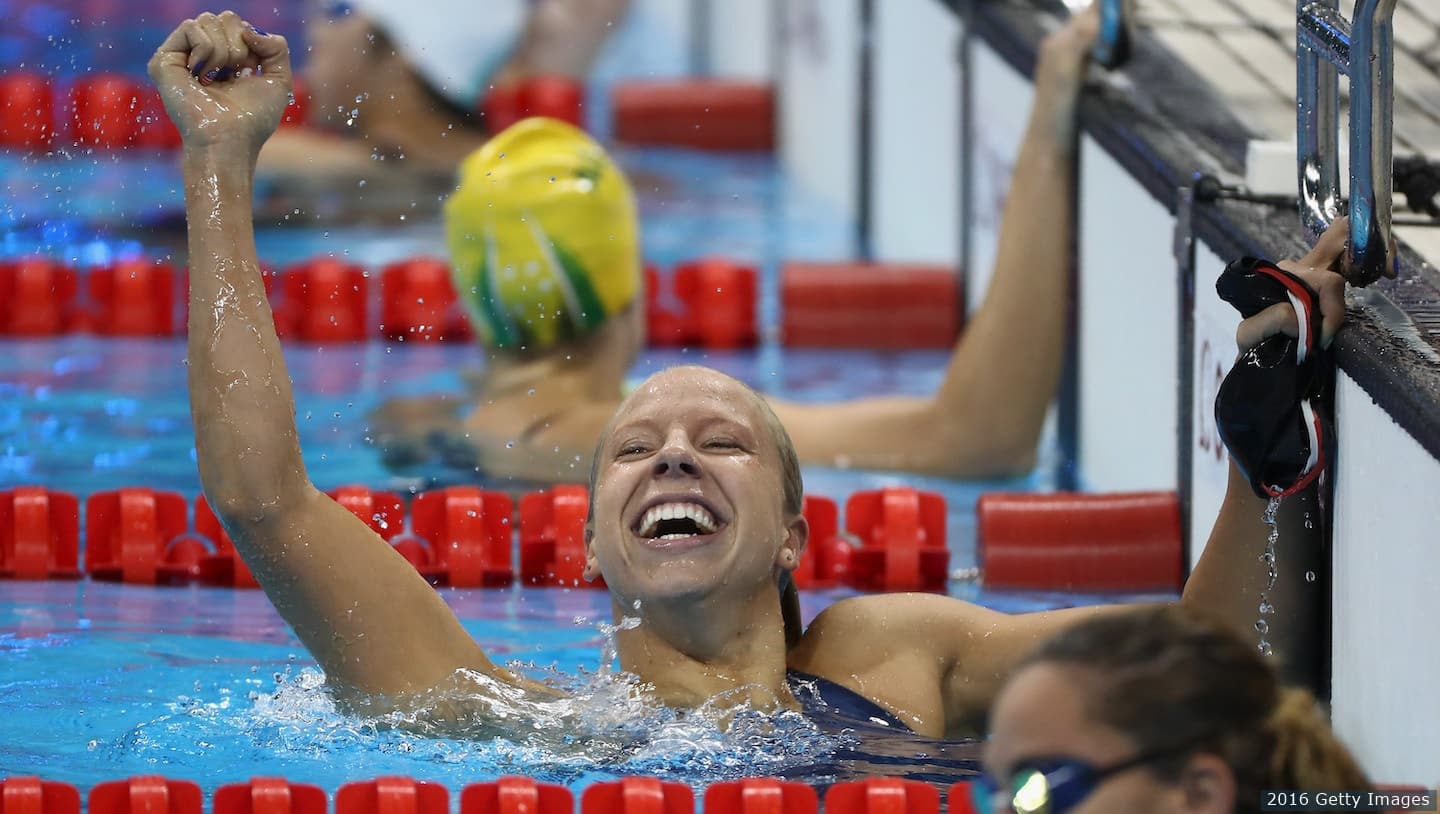
Restful Naps And Silent Screams: Michelle Konkoly’s Two-Week “Vacation” As A Swimming Commentator
by Karen Price

Michelle Konkoly celebrates in the pool at the Paralympic Games Rio 2016. (Photo: Getty Images)
Even when you’re comfortable in front of a camera and know a sport inside and out, working as a broadcaster isn’t always easy.
Like when your former teammate wins his first Paralympic gold medal in his third trip to the Games, and all you want to do is yell and cheer but you can’t.
Michelle Konkoly found that out firsthand when she was working for NBC as a color commentator for swimming during the Paralympic Games Tokyo 2020 this summer and Evan Austin won gold in the men’s 50-meter butterfly.
She posted her reaction during the live broadcast — pumping her fist in the air with her mouth wide open in a silent scream — to Instagram.
“I was freaking out in there,” Konkoly said. “When you’re working for NBC, you can’t cheer for Team USA. You have to be objective. But it was so hard for me to not root for him! And there were so many good races like that. I had to practice some lines with producers congratulating the athletes without openly saying, ‘Go USA.’”
Konkoly, 29, went to the Paralympics in 2016 and won four medals, including gold in the women’s 50- and 100-meter freestyle. But the Games were a one-and-done affair for her after already putting off medical school for two years in order to go to Rio. Now she’s Dr. Konkoly, having graduated from the Sidney Kimmel Medical College at Thomas Jefferson University in Philadelphia last spring.
She’s currently in a five-year program that combines pediatrics and rehabilitation medicine, and as a resident she can work up to 80 hours per week with lots of overnight shifts. This first year she’s focused solely on pediatrics.
“It’s challenging,” she said. “It’s something new every day. I truly never know what’s going to happen. I’m in the delivery room now so I’m in charge of resuscitating babies after they’re born, and you never know if the baby is going to come out crying or come out blue. So it’s not stressful at all.”
Years two through five, she said, will combine pediatrics with rehabilitation medicine, and she’ll be working part of that time at Magee Rehabilitation Hospital under the same doctor who cared for her after she fell out her dorm room window as a freshman at Georgetown University in 2011. The accident left her with broken bones, a shattered vertebra in her back and a damaged spinal cord. A Division I swimmer, she needed multiple surgeries and months of inpatient and outpatient rehabilitation.
While she’d always planned to go into medicine, Konkoly’s injury and the experience of being “put back together again” made her want to focus on pediatric rehabilitation. She did a clinical rotation at Magee also under her former doctor, and said that walking into the room with him to talk to terrified parents and family members gave her a new perspective.
“Being back in that setting allowed me to see it from a different lens,” she said. “When you’re in it this is something that’s happening to me, me, me, me. I wasn’t thinking about what my family was going through or what my parents were feeling.”
Despite her busy life as a resident, Konkoly still wanted to be a part of what was happening in Tokyo this summer, so she reached out to NBC and expressed an interest in doing commentary. She had to audition, but after she got the “yes” she was able to use her two-week vacation time to travel to NBC Sports headquarters in Connecticut and cover the Games.
What she enjoyed most, she said, was being able to use her unique background as a former athlete and someone with medical knowledge of people with disabilities to present Para swimming to the public.
“Every sentence I said in terms of how I described disability, that affects people’s language around disability,” she said. “For many people watching Para sports is their main exposure to people with disabilities so I wanted to make sure I represented the athlete accurately and highlight their abilities while also accurately portraying how their disability affects their swimming, but not in a negative way.”
Her regular schedule at the hospital also prepared her well for broadcasting in the middle of the night as well as during the day.
“The NBC producers kept apologizing, like, ‘We’re so sorry we only have this much time to nap during the day,’ and I’m like, ‘This is way more time than I usually have!’ I actually felt quite rested at the end of it, so I was pleasantly surprised.”
There was a time when Konkoly thought the Paralympics wouldn’t happen for her. After relearning to walk, she got back in the pool and continued swimming at Georgetown, but with permanent weakness in her legs it wasn’t the same. She found Para swimming, and tried out for the 2012 Paralympic team one month later.
She didn’t make it, and with medical school on the horizon she figured that was it.
“Then one day in college I was in the dining hall talking with my teammates and I was like, ‘I’m top three in the world at this point, but I have to go to medical school because that’s the plan,’” she said. “And they were like, ‘Are you crazy? You can wait a year or two to go to med school. You have the opportunity to do something really cool.’ That got me thinking that I could defer, that it didn’t eliminate the possibility but just put it on hold. And I’m so glad that I did.”
Karen Price #
Karen Price is a reporter from Pittsburgh who has covered Olympic and Paralympic sports for various publications. She is a freelance contributor to TeamUSA.org on behalf of Red Line Editorial, Inc.